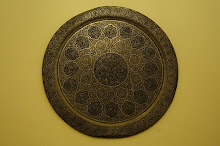 The astrolabe is an ancient astronomical computer designed for solving problems relating to time and the position of the celestial bodies in the sky.
The astrolabe is an ancient astronomical computer designed for solving problems relating to time and the position of the celestial bodies in the sky. Brass astrolabes were developed in the medieval Islamic world chiefly as an aid to navigation and as a way to locating the direction of Mecca for daily prayers. But they were also used for a variety of other purposes in the fields of astronomy, astrology, surveying, timekeeping and meteorology. Over 1,200 examples survive today.
The knowledge that gave rise to the creation of the astrolabe is said to have originated from the Greek astronomer Hipparchus who lived in the 2nd century BC - a man who may have also constructed the first rudimentary astrolabe.
An eighth century Persian mathematician, Mohammed al-Fazari, is credited with building the first astrolabe in the Islamic world. Another mathematician-astronomer, from Syria, Muhammed ibn Jaber al-Harrani al Battani (known to the West as “Albatenius”), contributed in the 9th and 10th centuries AD, by way of his scholarship, to the development and evolution of the astrolabe.
This particular piece shown above is a “planispheric astrolabe” and dates back to around 1500 AD. It is made of a four-metal alloy comprised of copper, lead, zinc and tin. It is 15 cm in diameter, and 2 cm thick.
Such astonishing masterpieces of instrumental art are an example of the great contributions that Arab and Islamic scientists made to the world by resuscitating the knowledge of the ancient Greeks and Romans (and their forebears) before developing it, and handing it off to an intellectually impoverished Europe that was fresh out of the Dark Ages.


















